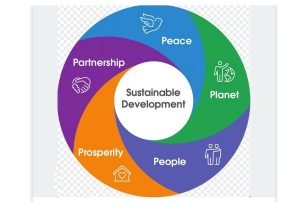. . SUSTAINABLE DEVELOPMENT . .
An article by Imtiaz Muqbil from eTurboNews (with links added by CPNN)
With brutal wars raging every day, it’s an interesting move for the UN to declare 2025 the International Year of Peace and Trust. ASEAN Tourism sees a window of opportunities.
2025 will mark the 80th anniversary since the end of World War II and the approval of the UN Charter, a good time to reflect on the state of the world since then.
The UN General Assembly has proclaimed 2025 the International Year of Peace and Trust (IYPT), and called for a fullscale mobilization of efforts to build sustainable peace, solidarity and harmony via political dialogue, mutual understanding and cooperation amongst nations and peoples.

ASEAN 2025
Within ASEAN, 2025 will mark the 50th anniversary since the April 1975 end of the Vietnam War and the last year of the “ASEAN 2025: Forging Ahead Together” master blueprint. That gives the ASEAN tourism, the Industry of Peace, a golden opportunity to take the lead in putting Peace at the heart of the future development agenda, assert the “centrality” of ASEAN, counter efforts to sow socio-cultural divisions and raise the definition of “sustainability” to a whole new level.
Approved on 21 March 2024, the UNGA resolution encourages all UN Member States, UN and other international, regional and subregional organisations, as well as civil society, the private sector, academia and individuals, to “disseminate the advantages of peace and trust, including through educational and public awareness-raising activities.” It invites the UN Educational, Scientific and Cultural Organization (UNESCO) and the UN’s Department of Political and Peacebuilding Affairs to facilitate the implementation of the International Year.
Turkmenistan has proposed hosts an International Forum of Peace and Trust in December 2025, as a culminating event for the Year.
The resolution was sponsored by Armenia, Bahrain, Bangladesh, Belarus, Brazil, Burkina Faso, Cambodia, China, Djibouti, Germany, India, Iran, Israel, Kazakhstan, Lesotho, Liberia, Marshall Islands, Morocco, Nicaragua, Nigeria, Philippines, Qatar, Russian Federation, Rwanda, Singapore, Tajikistan, Timor-Leste, Türkiye, Turkmenistan, Uzbekistan, Vanuatu and Venezuela.
(continued in right column)
How can tourism promote a culture of peace?
(continued from left column)
UN Sustainable Development Goals
The move is in line with the UN Sustainable Development Goals agenda as well as the Declaration and Programme of Action on a Culture of Peace.
The first UN Declaration and Programme of Action on a Culture of Peace was adopted by the UNGA in October 1999, exactly 25 years ago next year. In September 2019, the UNGA declared 2021 the first International Year of Peace and Trust. Another resolution in July 2022 declared that IYPT would be held every five years.
Reaffirming the purposes and principles of the UN Charter, especially the determination to save succeeding generations from the scourge of war, the resolution notes that sustainable development, human rights, peace and security are interconnected and mutually reinforcing. It:
The Six pillows of Peace and Trust
1) Acknowledges that peace and trust entail accepting differences and having the ability to listen to, recognize, respect and appreciate others, as well as living in a peaceful and united way,
2) Recognises that peace not only is the absence of conflict, but also requires a positive, dynamic participatory process where dialogue is encouraged and conflicts are solved in a spirit of mutual understanding and cooperation,
3) Recognises the urgent need to promote and strengthen preventive diplomacy and peaceful prevention of conflicts through multilateralism and political dialogue.
4) Emphasises the role of women and youth, children and older persons, especially the active participation of women in the prevention and resolution of conflicts and in activities promoting a culture of peace, including in post-conflict situations.
5) Recognises the importance of advancing equality, tolerance, human development, and promoting human rights, as well as investment in education to promote respect, reconciliation, and a culture of peace and non-violence,
6) Encourages the involvement of civil society organizations worldwide.
Windows of Opportunities for ASEAN Tourism
With escalating geopolitical conflicts and socio-cultural-ethnic polarisation posing a clear and present danger to the safety, security, and stability of Travel & Tourism globally, the IYTP opens a clear window of opportunity for the industry to rethink, refocus and reprioritize its future agenda.
(Editor’s note: The rest of this article is available only by subscription. It begins with the phrase “ASEAN tourism is well placed to take the lead for several reasons:”)